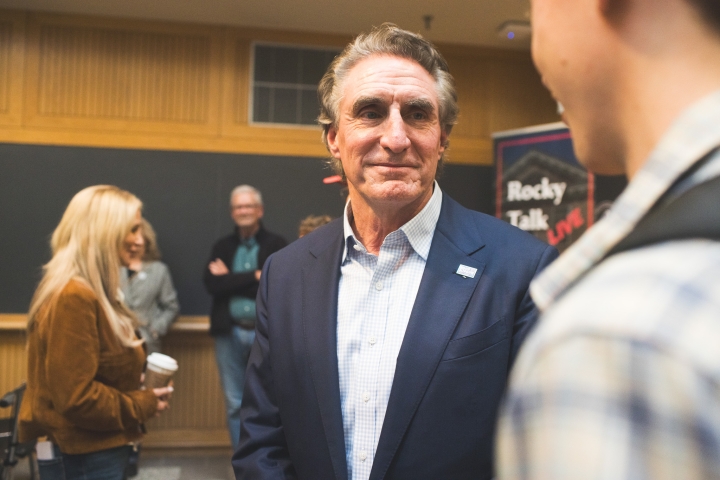The economy, energy, and national security—those are the three “completely intertwined” issues North Dakota Gov. Doug Burgum would tackle in the White House, the Republican presidential candidate said during a talk yesterday at the Nelson A. Rockefeller Center for Public Policy.
The hourlong event was the fourth in Rocky’s Path to the Presidency series, which is co-sponsored by the nonpartisan, student-led Dartmouth Political Union.
Burgum, a successful software entrepreneur before becoming governor, highlighted the effects of inflation and high interest rates on American families and the economy, which he said is crawling when it “should be sprinting,” and said his experience in business sets him apart from other Republican candidates.
To drive the economy, the next president needs experience in the private sector, particularly with technology, which is “changing every job, every company, and every industry.”
Burgum criticized the Biden administration’s goal of what he called “killing the US oil industry,” and state policies that inhibit access to natural gas. President Biden has won funding for billions of dollars in renewable-energy funding to combat global warming.
“We’re destroying the cleanest supply that we have in the world here and we’re replacing it with dirty supply from other places,” Burgum told the crowd of about 85 people in Hinman Forum, and those tuning in online.
When asked by Isaiah Menning ’24 about carbon capture projects in North Dakota, and how they might translate to a national stage, Burgum said the state’s regulatory framework combined with its unique geology enables it to both sequester carbon and “produce negative carbon liquid fuels.”

His is one of two states that “got out from underneath the EPA to be able to permit the wells,” Burgum said. So far, North Dakota has moved 42 million tons of the fuel to Canada via pipeline, and could store 50 years’ worth for the U.S., “if you can get it there.”
A pipeline project that would transport captured carbon dioxide to North Dakota from ethanol plants in five states for underground sequestration is currently on hold after being denied a permit in South Dakota.
Moderator Emma Wolfe, vice president for government and community relations, asked Burgum about his recent tweet after the Hamas attack on Israel regarding the U.S.’s “proxy war with Iran,” and what he would do if he were in the White House right now.
Burgum said if he were president, the U.S. wouldn’t have been pursuing an appeasement approach with Iran, “the parent company” of Hamas and Hezbollah.
He criticized the recent surge in Iran’s oil exports, “which are supposed to be sanctioned,” and last month’s unfreezing of $6 billion in Iranian oil revenue—a “workaround to try to reactivate the Obama Iran nuclear deal, which then moves them closer to a nuclear weapon.”
Burgum called what’s happened, including the kidnapping of 150 people and death of at least 25 Americans in Israel, “unthinkable,” and said the current situation could be traced to previous deals.
“You want to subsidize hostage taking? You’re going to get more of it three weeks later,” he said. “Now we’re in a thing where we’ve got terrorist organizations with American hostages. We can’t buy our way out of this.”
After the discussion, Menning said he was happy to hear Burgum’s response about carbon utilization and carbon sequestration.
If implemented on the national stage, it “could really be a good solution for climate issues that we have, because emissions are the problem, not necessarily fossil fuels,” said Menning, who is president of the recently formed Dartmouth chapter of the American Conservation Coalition, which advocates for limited government solutions to climate change.


